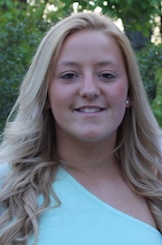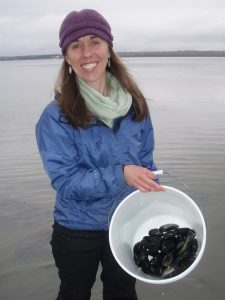Diana Davis Spencer Scholar Cassie Page
In January 2017, the Mitchell Center launched the Strengthening Coastal Economies project as part of the Diana Davis Spencer Partnership for a Sustainable Maine. The ultimate goal of this partnership is to inspire and equip a new generation of engaged, entrepreneurial leaders by providing students with transformative, hands-on experiences in the power of innovative partnerships to create a brighter future.
The team is led by assistant professor Bridie McGreavy of the Department of Communication and Journalism with assistance from assistant professor Damian Brady of the School of Marine Sciences, and assistant professor Keith Evans of the School of Economics.

Six students were recruited for the project—Tyler Quiring, Carter Hathaway, Gabby Hillyer, Tony Sutton, Shuling Chen, and Cassie Page. As Diana Davis Spencer Scholars, the students are learning new skills in entrepreneurship, teamwork, leadership and problem-solving. Five of the Scholars will continue their training this summer.
Scholar Cassie Page, who graduated from UMaine this month with a Bachelor’s degree in Communication, has focused her work on providing shellfish harvesters, state resource agencies like the Maine Department of Marine Resources (DMR), municipal shellfish committees, and non-governmental organizations with the latest information from scientific and technical reports.
This information is essential for helping shellfish stakeholders anticipate and work to solve key problems facing the industry, such as predation, water pollution, and business innovation needs. Under the supervision of Dr. Bridie McGreavy, Page began by reviewing and adding to a database of reports examining a wide range of issues, including shellfish conservation, regulation, and management.
Page’s most important contribution to the project was her work on the Shellfish Research Compendium that was distributed to participants at the Shellfish Focus Day, a day-long event held in conjunction with the 2018 Maine Fishermen’s Forum in Rockport. The Scholars, their faculty mentors, and community partners and leaders from Tidal Bay Consulting, the Island Institute, DMR, Manomet, Maine Coast Fishermen’s Association, The Nature Conservancy, and Union of Concerned Scientists helped organize and host various Shellfish Focus Day activities.
“…the experience really helped me build on both my research and communication skills and definitely helped build skills for my future career options as well.” —Cassie Page
The event brought together more than 100 stakeholders representing business and industry, government, academic institutions, and citizens groups. For the first time, this year’s event also supported a research and innovation needs listening session which resulted in multiple recommendations for applied projects that were shared with industry stakeholders.

There are a host of issues that negatively impact coastal communities and shellfish economies. For example, short-term and long-term water quality closures of clam flats due to polluted run-off cause major income losses every year. Further, predation of soft-shell clams by green crabs and milky ribbon worms can dramatically reduce local populations. Finally, social issues such as physical pain and limited access to scientific information can stall efforts to adapt to social and environmental changes.
A few communities in Maine have made progress on addressing issues such as these, but these efforts represent a drop in the bucket when it comes to tackling complex problems across the coast. Part of the challenge in scaling these efforts is that communities do not have a way of learning from each other and working together to address challenges.
The Compendium represents a key step in this sharing and learning process. It provides the shellfishing industry with a snapshot of recent and ongoing scientific studies in Maine and other New England states.
“The Shellfish Research Compendium brings together for the first time the most relevant information about the challenges facing Maine’s shellfisheries, and will be enormously helpful to the 78 municipalities that are working with harvesters and other partners to sustain the fishery,” says Kohl Kanwit, Public Health Bureau Director, Maine Department of Marine Resources.
One of Page’s jobs was to condense the research into concise, lay-friendly summaries that she then combined into a readily accessible tool for the diverse group of stakeholders.
“I went through a spreadsheet of over 50 different research projects to synthesize and interpret the information that was provided by the scientists,” Page says. “It was very challenging to go through someone else’s research and figure out the most important details to include,” she adds. But throughout that process, working independently as well as in collaboration with other Scholars, she gained valuable experience in communication and teamwork.
The Compendium has now been widely circulated to the shellfishing stakeholders, and there are plans to turn it into a living document; thereby making it an ongoing resource for the community. A longer report from the listening session that followed the Shellfish Focus Day will be distributed to the Maine Department of Marine Resources and other stakeholders. This report, along with a shorter technical memo to be distributed to all coastal municipalities with shellfish and marine resource commissions, will include information and a direct link to the Compendium.
“I’m very grateful to have had the opportunity to be a Diana Davis Spencer Scholar,” says Page. “Without that funding, I wouldn’t have been able to work alongside Dr. McGreavy. The experience really helped me build on both my research and communication skills and definitely helped build skills for my future career options as well.”
In recognition of her work on this report and her service to Maine’s second largest fishery, Page was awarded the Raymie McKerrow Award for the Distinguished Undergraduate Student in Communication & Journalism. This award recognizes the graduating senior who demonstrates outstanding citizenship on and off campus as well as academic excellence.
Notes former Maine legislator Chris Rector, “The many contributions made by the Diana Davis Spencer Scholars to the success of the Shellfish Focus Day are helping strengthen livelihoods and communities along the coast of Maine.”
—David Sims
